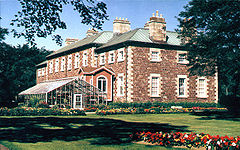Government House (Newfoundland and Labrador)
| Government House | |
|---|---|

Rear façade of Government House
|
|
| General information | |
| Architectural style | Georgian |
| Town or city | 50 Military Road St. John's, Newfoundland and Labrador |
| Country | Canada |
| Coordinates | 47°34′19″N 52°42′18″W / 47.572053°N 52.704878°WCoordinates: 47°34′19″N 52°42′18″W / 47.572053°N 52.704878°W |
| Construction started | 1827 |
| Cost | £38,000 |
| Client |
The King of the United Kingdom of Great Britain and Ireland (George IV) |
| Owner |
The Queen in Right of Newfoundland and Labrador (Elizabeth II) |
| Technical details | |
| Structural system | Timber framing and load-bearing masonry |
| Official name | Government House National Historic Site of Canada |
| Designated | 1982 |
Government House is the official residence of the Lieutenant-Governor of Newfoundland and Labrador. Government House was a by-product of the wave of administrative initiatives that took place during the 1820s. The royal charter of 1825 bestowed official colonial status for Newfoundland.
The first governors of Newfoundland were naval officers who resided on their flagship, anchored in St. John's harbour. However, Admiral Richard Edwards decided it would be more apt for the Governor to live ashore, and thenceforth the governor resided at Fort Townshend, where the first Government House was constructed. Completed in 1781, it was intended to be a summer house for the governors, but remained in constant use until the present structure was finished in 1831. Never intended for winter use, the inhabitants complained of the cold, and Francis Pickmore even died there in the winter of 1818.
The building plans for Government House were drawn up in England. The Ordinance had told the Treasury that workmen's wages were too high in Newfoundland, and subsequently, workmen in Scotland were engaged and arrived in St. John's to begin construction in April 1827. The original plan as conceived by Governor Cochrane was for a two-storey house, plus basement. When completed in 1831, Government House cost £38,175, which was five times the original estimate and an enormous expense at the time. The two-storey building consists of a centre block flanked by slightly lower wings on the east and on the west. The exterior is of rough, red sandstone quarried at Signal Hill, trimmed with English Portland stone.
...
Wikipedia
